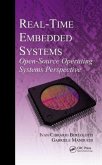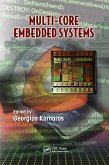Real-time embedded systems are driving an information revolution with their pervasion in our everyday lives. The design of heterogeneous embedded systems poses a host of technical challenges that differ from those faced by general-purpose computers since they have much larger design space and are more complicated to optimize in terms of cost, timing, and power. This book provides state-of-the art information on new trends and applications in real-time embedded systems. Describing the theoretical frameworks behind these systems, the authors provide a systematic reference on the foundations behind the design, optimization, control, and networking of these systems.
Ubiquitous in today's consumer-driven society, embedded systems use microprocessors that are hidden in our everyday products and designed to perform specific tasks. Effective use of these embedded systems requires engineers to be proficient in all phases of this effort, from planning, design, and analysis to manufacturing and marketing. Taking a systems-level approach, Real-Time Embedded Systems: Optimization, Synthesis, and Networking describes the field from three distinct aspects that make up the three major trends in current embedded system design. The first section of the text examines optimization in real-time embedded systems. The authors present scheduling algorithms in multi-core embedded systems, instruct on a robust measurement against the inaccurate information that can exist in embedded systems, and discuss potential problems of heterogeneous optimization. The second section focuses on synthesis-level approaches for embedded systems, including a scheduling algorithm for phase change memory and scratch pad memory and a treatment of thermal-aware multiprocessor synthesis technology. The final section looks at networking with a focus on task scheduling in both a wireless sensor network and cloud computing. It examines the merging of networking and embedded systems and the resulting evolution of a new type of system known as the cyber physical system (CPS). Encouraging readers to discover how the computer interacts with its environment, Real-Time Embedded Systems provides a sound introduction to the design, manufacturing, marketing, and future directions of this important tool.
Ubiquitous in today's consumer-driven society, embedded systems use microprocessors that are hidden in our everyday products and designed to perform specific tasks. Effective use of these embedded systems requires engineers to be proficient in all phases of this effort, from planning, design, and analysis to manufacturing and marketing. Taking a systems-level approach, Real-Time Embedded Systems: Optimization, Synthesis, and Networking describes the field from three distinct aspects that make up the three major trends in current embedded system design. The first section of the text examines optimization in real-time embedded systems. The authors present scheduling algorithms in multi-core embedded systems, instruct on a robust measurement against the inaccurate information that can exist in embedded systems, and discuss potential problems of heterogeneous optimization. The second section focuses on synthesis-level approaches for embedded systems, including a scheduling algorithm for phase change memory and scratch pad memory and a treatment of thermal-aware multiprocessor synthesis technology. The final section looks at networking with a focus on task scheduling in both a wireless sensor network and cloud computing. It examines the merging of networking and embedded systems and the resulting evolution of a new type of system known as the cyber physical system (CPS). Encouraging readers to discover how the computer interacts with its environment, Real-Time Embedded Systems provides a sound introduction to the design, manufacturing, marketing, and future directions of this important tool.








